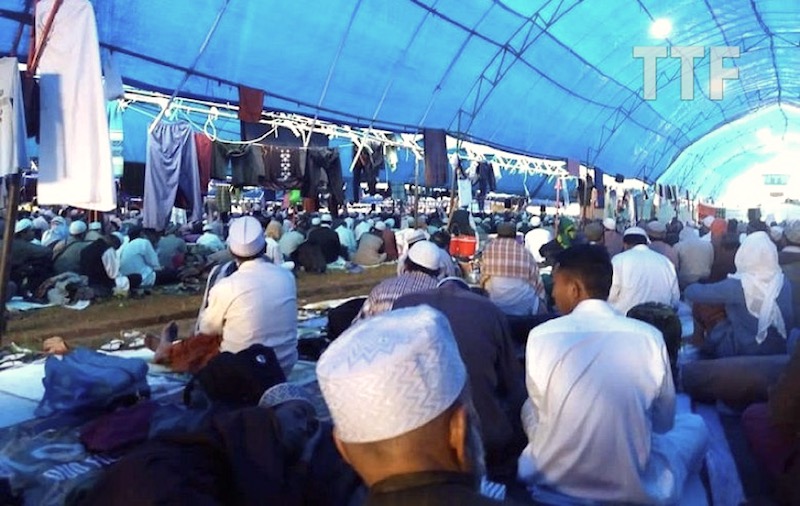
“Disease, in Islam, is an ill that must be prevented before occurrence or treated after occurrence wherever possible. There is nothing stated in Islam to the effect that one must gather the ummah for religious purposes if it serves to put the ummah at risk of disease that can be prevented”
Raggie Jessy Rithaudeen
ڤڠنجور ڤرهيمڤونن بسر إندونيسيا ترساسر تروق، اومه د رنتاو اسيا تردده بهاي
The refusal of Indonesian authorities to prevent a mass gathering of Muslim pilgrims from across Asia could touch off a regional Covid-19 tsunami with dire consequences to the ummah and Southeast Asian economy.
According to reports, thousands have gathered since Wednesday despite a similar event in Malaysia causing over 500 infections.
According to Reuters, organisers and regional officials said the event in the world’s fourth most populous nation had begun, although the regional police chief said he was making a last ditch-effort to persuade organisers to call it off.
“We are more afraid of God,” one of the organisers, Mustari Bahranuddin, told Reuters, when asked about the risk of participants spreading the virus at the event in Gowa in Indonesia’s province of South Sulawesi.
“Because everyone’s human, we fear illnesses, death,” he said. “But there’s something more to the body, which is our soul.”
Reuters further said organisers had rejected a formal request from authorities to postpone the gathering, quoting a regional official, Arifuddin Saeni.
Arifuddin estimated that 8,695 people had already assembled in Gowa, near the provincial city of Makassar, adding that the numbers would make it hard to put a halt to the proceedings.
“They are still coming,” he said. “There are people from Thailand, Arabia, India and the Philippines.”
The Malaysian event, held from the 27th of February to the 1st of March, drew 16,000 followers and was organised by members of Tablighi Jama’at, a global movement that promotes the deepening of Islamic understanding.
Tablighi Jama’at is also behind the Indonesian gathering and is well aware of the consequences the gathering in Malaysia had on its people.
But they’re pushing ahead.
Organisers should take note that a conscious effort to protect oneself against any form of bodily threats in the face of disease is paramount and supersedes the need to go ahead with the gathering.
The insistence of organisers holding the event contravenes a requirement of Muslims, which is to safeguard and protect not just the interests of the Islamic ummah, but its well being.
Ultimately, Allah only helps those who help and fear Him – he who knows that his actions may be to the detriment of the ummah but continues to perform these actions is doing a disservice to Islam.
Islam is a holistic belief system and takes into account the physical, emotional, and spiritual well being of individuals and societies.
Although care of the individual is important, safeguarding communities, including its weakest members, is of paramount importance.
More than 1400 years ago, the Prophet Muhammad, may the mercy and blessings of God be upon him, was teaching his followers hygiene practices that are still applicable in the 21st century.
From the traditions of the Prophet Muhammad, we find evidence that clearly indicates Islam’s stance on coughing and sneezing openly.
Even the Prophet Muhammad instructed the believers to cover their faces when sneezing, and this can easily be confirmed if one studies parts of the Qu’ran and Hadith that deal with hygiene.
“Truly, God loves those who turn unto Him in repentance and loves those who purify themselves.” (Quran 2:222)
In the traditions of Prophet Muhammad, cleanliness is mentioned as half of faith. Therefore, it is important to keep the body fresh and clean and Islam insists on several practices to facilitate this.
Disease, in Islam, is an ill that must be prevented before occurrence or treated after occurrence wherever possible.
There is nothing stated in Islam to the effect that one must gather the ummah for religious purposes if it serves to put the ummah at risk of disease that can be prevented.
The human is required to use his (or her) limited human knowledge to extrapolate from a present situation to anticipate certain disease conditions for which preventive measures can be taken.
Only Allah knows for sure whether the diseases will occur or not. But Islam dictates that the human can use knowledge of risk factors for a particular disease to predict risk.
The organisers of the Indonesian event obviously do not understand this and have failed to fulfill their duties as Muslims or learn from their experience in Kuala Lumpur.
HUNDREDS INFECTED IN MALAYSIA
According to Reuters, about two-thirds of Malaysia’s 790 infections have been traced to the meeting at a mosque complex on the outskirts of Kuala Lumpur, the capital.
Tiny neighbour Brunei has confirmed 50 infections linked to it, while Cambodia, the Philippines, Singapore, Thailand and Vietnam have also said citizens were infected there.
Organisers in Indonesia were checking pilgrims’ temperatures as a precaution, Bahranuddin added. Saeni said health officials had visited the site and asked to monitor participants.
By Wednesday, Indonesia’s tally of infections stood at 227, with 19 deaths. The nation of 260 million had run just 1,255 tests by Tuesday. By contrast, South Korea, with a population of a fifth that size, is doing more than 15,000 tests a day.



